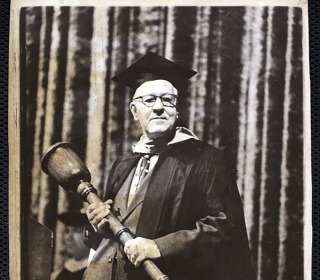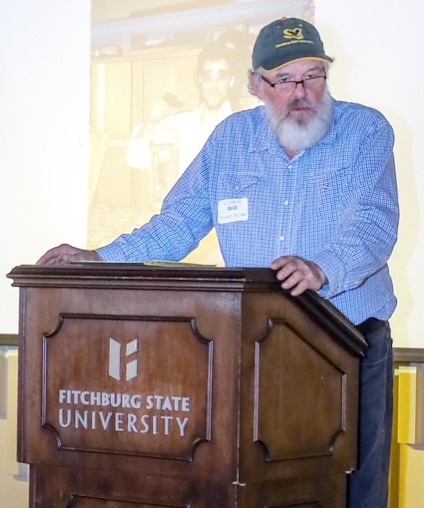As most of its 50,000 alumni know, Fitchburg State was founded in 1894 as the Normal School at Fitchburg, with a goal of training teachers to serve North Central Massachusetts.
Another specialty program followed soon in its wake: manual arts. This program evolved in the coming years, with its name changing to practical arts, then industrial arts. In the 1930s, it became its own baccalaureate program at the school. (Its evolution has continued to the Engineering Technology Department with robust undergraduate and graduate offerings.)
A seminal figure in the industrial arts program’s success arrived on campus as a student in 1936. Walter F. Harrod’s name would become entwined in Fitchburg State’s history as a long-serving faculty member who made an incalculable impact as a teacher and mentor.
This fall, the campus hosted an industrial arts reunion that attracted more than 100 graduates from the 1950s to the 2000s. Harrod’s name was invoked to a standing ovation by Will French ‘76, one of the primary organizers of the event, which also included a classic car show along Highland Avenue that visitors enjoyed amidst campus tours.
“It’s great to throw a party and have people show up,” French said. “I’m hopeful that you are all here today enjoying the campus, and mostly good memories and appreciation for what you left here with. This reunion is to be dedicated in memory of Walter Harrod.”
French, who grew up in Sterling, came to Fitchburg State comparatively late in his educational career. He had studied liberal arts elsewhere and was already in the workforce when a friend told him about Fitchburg State’s industrial arts program. “It just lit the spark and I had to look into it,” he said.
And that is when he met Walter Harrod, who his loyal students recall as much more than a teacher.
“Walter was a role model as an extremely excellent craftsman,” French said. “He was a craftsman of wood and furniture making, and a craftsman of working with the young students who found themselves in front of him. I took every course I could with him, in addition to all the others that were required of us.”
Many of the alumni who assembled at the industrial arts became vocational education teachers. Some had moved on to careers in the private sector, and many have since retired. French, for example, taught high school and then went into private industry, later returning to education to finish his career teaching in community college.
While his path took him out of the wood shop, the lessons he learned from Harrod carried over. “He taught the attitude of doing your work as well as possible,” French said. “A craftsman takes pride, and Walter shared that with us.”
Many of Harrod’s former students kept in touch in the years after his own retirement from Fitchburg State in 1978.
“There was something about Mr. Harrod,” French said. “He was the role model that made a difference in their lives and how they approached things. He was an easy man to want to know. He had the good fortune of 22 years of retirement, and he was commonly found in his shop, at home. I don’t know how he got anything done because he had so many visitors. Everybody gravitated to him.”
Harrod’s legacy endures. The Walter F. Harrod ‘40 Scholarship is awarded annually at the Honors Convocation, and the prestigious faculty lecture series on campus is named for him.
Looking ahead, his former students are looking to preserve the physical artifacts of Harrod’s life’s work, namely his prized collection of antique woodworking tools.
Alumni are helping to create a curated display of Harrod’s tools, as well as raising funds to create the Industrial Arts Alumni Scholarship in memory of Walter Harrod. Those interested in supporting the scholarship fund can make their gift online at fitchburgstate.edu/GIVE (type IA-Harrod in the box) or call the Alumni & Development Office at 978-665-4555.

